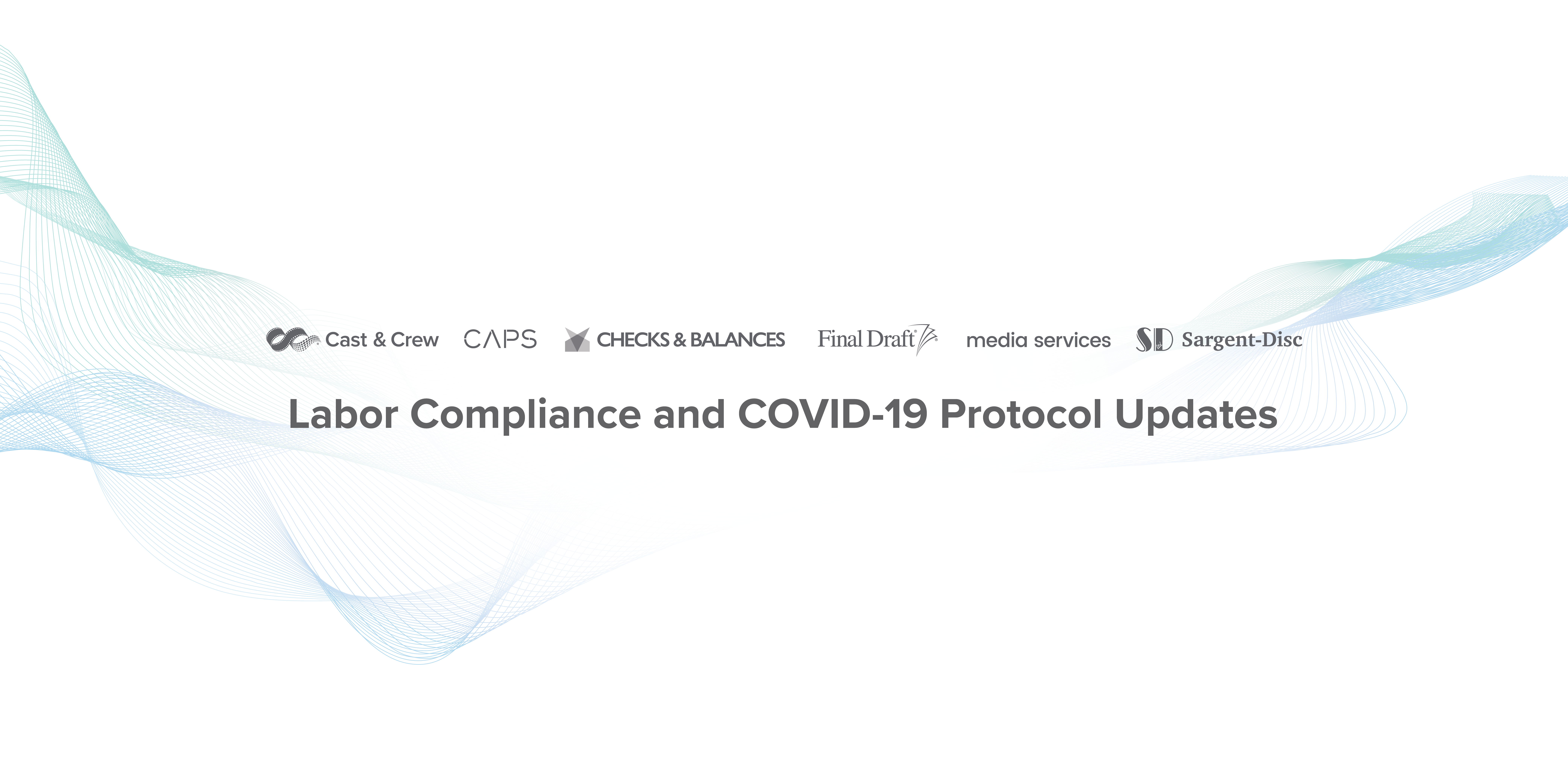A Labor Compliance Roundup
Here is brief look at updated Labor Compliance laws as of July 2021. We cover everything from COVID-19 compliance and state and local initiatives to international law.
COVID-19 Updates
EEOC COVID-19 FAQ Update, May 2021
On May 28, 2021, the EEOC released updated guidance regarding COVID-19 vaccinations and other commonly asked questions related to return to work. Key points include information on activities fully vaccinated people can resume, mandatory and voluntary workplace vaccination, incentives for vaccination and accommodation considerations. Guidance from public health authorities is likely to change as the COVID-19 pandemic evolves. Therefore, employers should continue to follow the most current information on maintaining workplace safety.
Additional information is available here.
Massachusetts Emergency Paid Sick Leave (MA EPSL), Effective June 2021
Massachusetts has established a statewide mandate, June 7, 2021, to September 30, 2021, for employers to provide employees up to 40 hours of emergency paid sick leave when they are unable to work due to reasons related to the pandemic, including for vaccinations. The new MA EPSL benefit is in addition to existing paid time-off benefits offered by employers, and the cost to employers is eligible for reimbursement from a newly established state fund.
Additional information is available here.
Cal/OSHA Emergency Temporary Standards (ETS), Effective June 2021
The board has voted on several updates to Cal/OSHA ETS to be effective immediately which are in place to protect workers from COVID-19 and for infection prevention. The changes adopted phase out physical distancing and make other adjustments to better align with the state’s goal to fully reopen and more closely align with every other public health authority. California employers should carefully consider face coverings, physical distancing, partitions, COVID-19 testing, and prevention standards when developing its written COVID-19 Prevention Program.
Additional information is available here.
British Columbia COVID-19 Illness and Injury Paid Leave, Effective May 2021
On May 20, 2021, the Government of British Columbia passed Bill 13 to provide an employee with up to three paid sick days if they need to stay home for reasons related to COVID-19. An employee is entitled to be paid at least an average day’s pay, and employers may be entitled to obtain a reimbursement. This leave is in addition to the up to three hours of paid COVID-19 vaccination leave.
Additional information is available here.
Mandating COVID-19 Vaccination Among a Union Workforce
In a non-union environment, mandating the vaccine generally is permissible, so long as the employer allows exceptions for religious or health reasons. However, employers of union-represented employees know that wages, hours, and other conditions of employment are mandatory subjects of collective bargaining agreements that can only be changed if permitted by the applicable CBA or bargained for. Although the National Labor Relations Board (NLRB) has not yet explicitly addressed whether a mandatory COVID-19 vaccination program is a compulsory subject of bargaining, NLRB precedent strongly suggests that it is. Employers should continue to monitor any applicable union discussions for proposed changes to a CBA or other language related to health and safety practices and polices supporting a mandatory COVID-19 vaccination program among its union-represented staff.
Additional information is available here.
Santa Clara County, CA Vaccination Status Tracking Requirement, May 2021
On May 18, 2021, the Santa Clara County health officer released an updated health order mandating employers determine the vaccination status of all employees, independent contractors, vendors, volunteers, and other personnel. The vaccination status assessment is required every 14 days, records of which must be maintained by employers.
Additional information is available here.
Federal Law Updates
Form I-9 Guidance for H-2B Workers Seeking To Change Employers (86 FR 28198)
On May 25, 2021, the Department of Homeland Security and the Department of Labor published a joint Federal Register temporary rule to provide portability flexibility for H-2B workers already in the U.S. to begin work immediately with a new employer after an H-2B petition is received by USCIS and before it is approved. Under this temporary rule, portability applies if the new employer’s extension of stay H-2B petition was received before May 25 and is pending on May 25. The new employer may employ the H-2B worker while the extension of stay petition is pending for a period of 60 days. Portability will also apply if USCIS receives the H-2B petition between May 25 and November 22, 2021. The H-2B worker is authorized to begin employment with the new employer for a period not to exceed 60 days.
Additional information is available here.
State and Local Law Updates
Virginia Overtime Wage Act (VOWA), Effective July 2021
On July 1, 2021, VOWA will become effective and deviates from the Fair Labor Standards Act (FLSA) in a number of ways, including a new method for calculating regular rate pay and an extended statute of limitations. For non-exempt salaried workers, the VOWA deviates from the FLSA definition of a salaried worker’s regular rate of pay calculation and instead defines a salaried worker’s regular rate of pay as one-fortieth of all wages paid in a particular week.
Additional information is available here.
New Mexico Healthy Workplaces Act (HWA), Effective July 2021
New Mexico House Bill 20 was signed into law on April 8, 2021 and takes effect July 1, 2022. HWA will require all private employers to provide paid leave to employees that can be used to care for themselves or assist family members. Accrual will be at the rate of one hour for every 30 hours worked with a 64-hour annual leave and accrual cap. Continued monitoring of the state’s website will be conducted for any updates before the July 1, 2022, effective date.
Additional information is available here.
New York HERO Act, June 2021
On May 5, 2021, New York Governor Andrew Cuomo signed into law the New York Health and Essential Rights Act (HERO Act) to be effective June 4, 2021. The bill requires businesses to have safety standards in place to prevent further spread of COVID-19 and other airborne diseases. The Department of Labor and the Department of Health will issue mandatory guidelines and model safety plans which will be industry specific.
Additional information is available here.
Illinois Wage Payment and Collection Act, May 2021
The amendment to the Illinois Wage Payment and Collection Act (IWPCA) will significantly increase penalties for wage payment violations. Under the IWPCA, employers that violate such legislation are liable for underpayments and statutory penalties of 2% for each month during which the amount remains unpaid. Effective immediately upon the Governor’s signature, the number of statutory penalties will more than double to 5% per month, which has the potential to greatly increase an employer’s exposure for violations.
Additional information is available here.
California Pay Statement Requirement Court Decisions, May 2021
Recent federal and state decisions in California addressing the pay statement requirements of the Labor Code have provided helpful and favorable guidance to employers navigating the web of employment statutes and regulations. The recent decisions demonstrate state and federal courts’ developing willingness to accept employers’ efforts at complying with the requirements of California’s employee-friendly Labor Code and rejected hyper-technical challenges. These small victories for employers also provide clarity and a reminder that the purpose of the wage statement is to enable employees to see how they are paid.
Additional information is available here.
International Law Updates
European Commission Standard Contractual Clauses, June 2021
On June 4, 2021, the European Commission adopted new Standard Contractual Clauses (SCC) to permit lawful transfers of personal data from the European Union (EU) to third countries such as the United States. This development is critical for key aspects of global human resources administration and web-based platforms. U.S. multinational employers have more than 18 months to migrate to the new SCCs but should not wait since the new SCCs require enhanced safeguards and notice, reporting, and recording obligations.
Additional information is available here.
Canadian National Day for Truth and Reconciliation, June 2021
On June 3, 2021, Bill C-5, An Act to amend the Bills of Exchange Act, the Interpretation Act, and the Canada Labour Code, received Royal Assent that will come into force effective August 3, 2021, creating a holiday called the National Day for Truth and Reconciliation. The new holiday will be observed by the federal government and federally regulated workplaces every year, starting September 30, 2021.The purpose of this new holiday is to honor First Nations, Inuit and Metis Survivors, their families and communities, and ensure that public commemoration of their history and the legacy of residential schools remains a vital component of the reconciliation process.
Additional information is available here.

